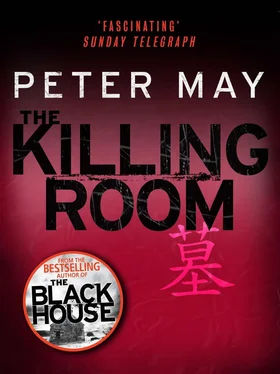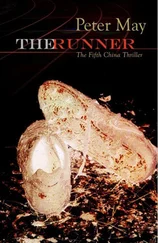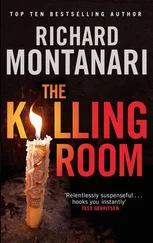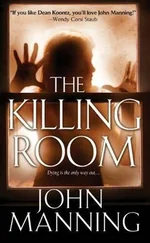Peter May - The Killing Room
Здесь есть возможность читать онлайн «Peter May - The Killing Room» весь текст электронной книги совершенно бесплатно (целиком полную версию без сокращений). В некоторых случаях можно слушать аудио, скачать через торрент в формате fb2 и присутствует краткое содержание. Год выпуска: 2012, Издательство: Quercus, Жанр: Триллер, на английском языке. Описание произведения, (предисловие) а так же отзывы посетителей доступны на портале библиотеки ЛибКат.
- Название:The Killing Room
- Автор:
- Издательство:Quercus
- Жанр:
- Год:2012
- ISBN:нет данных
- Рейтинг книги:5 / 5. Голосов: 1
-
Избранное:Добавить в избранное
- Отзывы:
-
Ваша оценка:
- 100
- 1
- 2
- 3
- 4
- 5
The Killing Room: краткое содержание, описание и аннотация
Предлагаем к чтению аннотацию, описание, краткое содержание или предисловие (зависит от того, что написал сам автор книги «The Killing Room»). Если вы не нашли необходимую информацию о книге — напишите в комментариях, мы постараемся отыскать её.
The Killing Room — читать онлайн бесплатно полную книгу (весь текст) целиком
Ниже представлен текст книги, разбитый по страницам. Система сохранения места последней прочитанной страницы, позволяет с удобством читать онлайн бесплатно книгу «The Killing Room», без необходимости каждый раз заново искать на чём Вы остановились. Поставьте закладку, и сможете в любой момент перейти на страницу, на которой закончили чтение.
Интервал:
Закладка:
He had also failed himself. He had allowed personal feelings, conflicting emotions about Mei-Ling and Margaret, to distract him from his professional obligations. And he had failed to do the only thing he had ever sought to do — to make a difference. It was why he had wanted to join the police all those years ago. He had seen it as a means of reinforcing his own very powerful sense of right and wrong, of fairness and justice. He knew he could never bring fairness to the lives of those poor dead women, but now he was failing to deliver them justice as well.
He stubbed out his cigarette and lit another, feeling himself sliding into the slough of despond. He let his eyes wander across the mess of papers on his desk, until they came to rest on a cardboard box sitting on the floor against the wall. It was the box the caretaker at the Xujiahui apartments had given him of Chai Rui’s belongings. He had dumped it in his office the night before and not yet had a chance to go through it. He leaned over and lifted it on to the desk, sifting idly through its meagre contents. Some cheap jewellery, a diary without a single entry, bottles of perfume and nail varnish remover, the miscellaneous contents of a bathroom cabinet, a hairbrush with strands of her hair still caught in it. He teased the hair out through his fingers and smelled her perfume on it. For family, friends, perhaps lovers, that scent would spark memories, half-remembered moments from a life cut so short. Twenty-two years old. Li looked at the contents of the box and thought how little they were to show for a life.
Face down at the bottom of the box was a dog-eared photograph. He lifted it out. Chai Rui was grinning gauchely at the camera. It was a cheap print, and the colours were too strong. He remembered the body parts laid out on the autopsy table ten months earlier. All life and animation long gone. Standing beside her, an arm around her shoulder, was a Western man, considerably older. He had a head of thick dark hair starting to go grey, and there was a warmth in his smile. Li wondered briefly if he might have been a customer. But there was something more intimate in the body language. Had he been a lover? He stared at the picture for a long time, held by the eyes that gazed out at him from the cracked glaze of the print, and felt terribly sad. If he could not make a difference, what was the point?
He dropped the photograph back in the box and pushed it away. He wondered what had happened to Chai Rui’s little girl. If she hadn’t taken her with her to Beijing, then someone, somewhere, must surely still be looking after her. He remembered the file on her that Mei-Ling had retrieved from Dai, and he lifted it towards him and opened it up. Immediately he was disappointed. There was very little in here. Some official records, copies of birth certificates, death certificates, school documents, a medical report. Chai Rui had been the only child of Chau Ye and Elizabeth Rawley, an American who had lived in Shanghai since the early eighties. So Margaret had been wrong about the Japanese genetic heritage. Statistics did not always lead you to the right conclusion. He shuffled through the remaining documents. Just about the time she had left school her parents had been killed in a car crash, and she had simply vanished off the official record, swallowed up into the anonymity of what the authorities called the ‘floating population’. This ever-expanding section of Chinese society, created by growing unemployment and the collapse of the state-owned enterprises, was a breeding ground for crime and corruption, where drug abuse and prostitution flourished and festered. It was, inevitably, where Chai Rui had slipped into addiction and sexual abuse.
And yet here was another contradiction. She had lived in an expensive apartment, paid cash for costly dental work, been able to afford a babysitter for her child. It did not fit with everything else they knew about her. Li wondered again what had happened to the child, and the thought led him to his own problem of Xinxin and her future. It was no life for her, stuck in a hotel room with a babysitter, moved around from one kindergarten to another, never knowing where to call home or who would come through the door at night. It was a problem he knew he would have to deal with as soon as this case was over. If this case would ever be over.
III
Xinxin’s shrieks of pleasure split the air and echoed around the park. Her knuckles glowed white as she gripped the tiny steering wheel on the little red, plastic car and pressed the accelerator pedal to the floor. The car sailed through a red light at a cross junction, narrowly missing a small boy on a blue motorbike and sidecar. Margaret, almost helpless with laughter, tried to explain to Xinxin that running red lights was not the object of the exercise. But communication that sophisticated was not possible. And, anyway, there was no real danger. Margaret could have climbed out of the car and walked faster. Xinxin was in seventh heaven, her bunches bouncing around on either side of her head, her face a picture of concentration and happiness. She flew round a roundabout the wrong way and her laughter pealed out again in the misty afternoon. She stole a glance at Margaret, and something about the mischief in those dark eyes led Margaret to believe that Xinxin knew only too well which way she was supposed to go round the roundabout, and that you were meant to stop at red lights.
They passed under a bridge, and an elderly couple sitting on a bench at the side of the miniature road waved, laughing at the sight of the little Chinese girl shrieking like a banshee and the blue-eyed foreign devil with the blonde hair squeezed into the tiny car beside her. They passed a yellow car coming in the opposite direction, a proud father smiling fondly as his son took evasive action to avoid a head-on collision with Xinxin.
The streets were bordered by narrow, paved sidewalks, and cut through large grassy areas planted with trees and neatly manicured shrubs and hedges. At intervals, there were five- and six-foot replicas of landmark buildings in Shanghai including, Margaret noticed as they whizzed past it, a model of the Peace Hotel, with its distinctive green copper roof rising to a point. In one corner of the park children played on chutes and swings under the watchful eyes of adoring parents. In another, dads and sons, and moms and daughters, pedalled tiny carriages around an overhead monorail. Beyond the fence that marked the boundary of the Tiantan Traffic Park, skyscrapers and tower blocks rose pale and colourless into a burned out sky. Somewhere above the mist, the sun was trying to push its way through, and it was sticky warm.
They swung around again past the entrance gate, where three-foot models of Goofy and Mickey Mouse and Donald Duck and Pinocchio caused Xinxin no end of amusement. She gazed at them in delight as they passed, and Margaret had to grab the wheel to prevent them from mounting the sidewalk. They passed stone statues of a boy reclining and a girl dancing, and Xinxin swung them back into the main drag that bisected the park. She showed remarkable control of the tiny vehicle, and Margaret thought she would have no trouble getting a job as a taxi-driver in Beijing. They took a left, heading towards the open shed where the toy cars and motorbikes were collected and returned, then right again, past an area under construction. A workmen’s grey van was parked there beside a mechanical digger. Xinxin made another round of the park, and Margaret just sat back and enjoyed the ride. She had not felt this relaxed or this happy in a long time. She felt nothing but warmth and affection for little Xinxin. The only cloud on her happiness was a distant ache somewhere inside for a child of her own, and a sense of loss over the child she might once have borne.
Читать дальшеИнтервал:
Закладка:
Похожие книги на «The Killing Room»
Представляем Вашему вниманию похожие книги на «The Killing Room» списком для выбора. Мы отобрали схожую по названию и смыслу литературу в надежде предоставить читателям больше вариантов отыскать новые, интересные, ещё непрочитанные произведения.
Обсуждение, отзывы о книге «The Killing Room» и просто собственные мнения читателей. Оставьте ваши комментарии, напишите, что Вы думаете о произведении, его смысле или главных героях. Укажите что конкретно понравилось, а что нет, и почему Вы так считаете.












